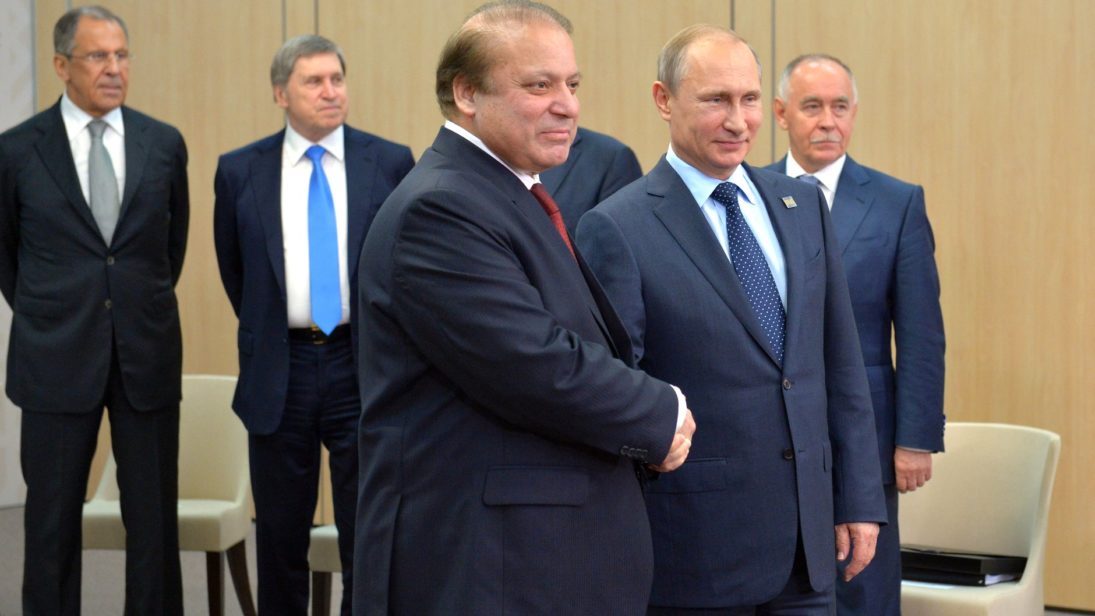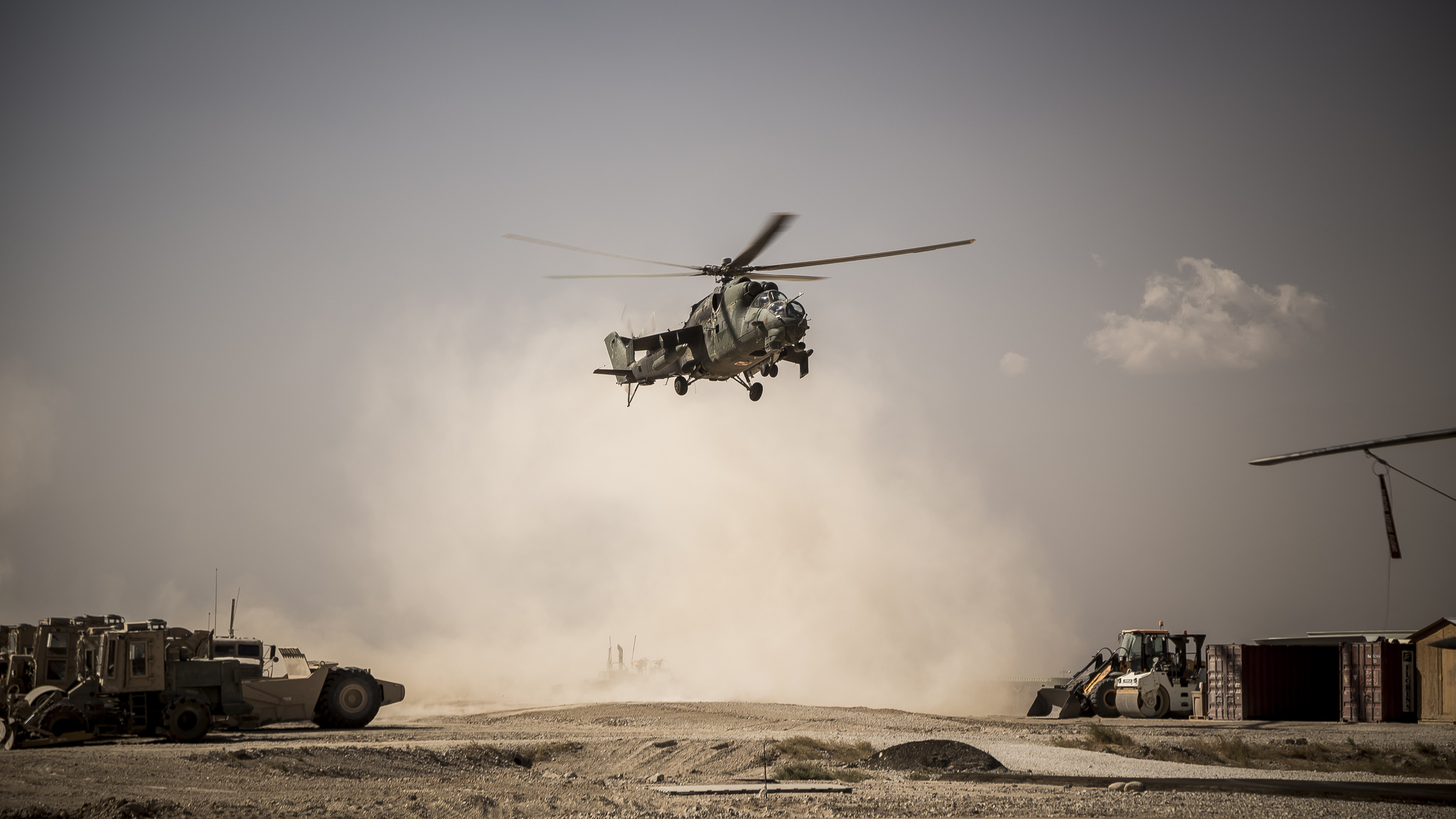
The evolving strategic environment in South Asia, in addition to shifting power arrangements at the global level, has led to some important, yet strange, alliance formations. Russia and Pakistan, once Cold War antagonists, are bolstering bilateral ties across diverse realms. The warming of relations between Moscow and Islamabad can be seen as a manifestation of fresh foreign policy directives, as well as the Pakistan’s increasing role in its immediate neighborhood. Alternately, it may signal Islamabad’s deviation from its traditional policy of looking “West” and a desire to reduce its overwhelming dependency on the United States. In addition, Pakistan seeks Russia’s constructive role in peace and stability in war-torn Afghanistan.
There are several possible motivations behind Pakistan and Russia’s increasing proximity, but the continued chaos in Afghanistan appears to be the focal point. In a meeting with his Russian counterpart, Sergei Shoigu, Pakistan’s Defense Minister Khawaja Asif emphasized Russian engagement in the Afghan peace process. For Pakistan, Russia’s constructive engagement in peace building is pertinent to defeating ISIS, which poses a threat to the entire Asian region.
On April 14, Russia convened a third round of conferences on peace, stability, and the reconciliation process in Afghanistan. However, the absence of major stakeholders—including the United States and NATO—demonstrates the divergent preferences of major powers in advancing the reconciliation process. This great power tug of war simply adds to Afghanistan’s fragile situation and further impairs the peace process. In fact, the U.S.-Russia divide in conflict prone Afghanistan creates the ideal situation for ISIS to gain a stronghold.
Moscow and Islamabad’s cooperation to accommodate the Taliban, particularly those who oppose the rise of ISIS and want to participate in the political system, could ultimately improve the security situation in Afghanistan. Moreover, the reconciliation of the Taliban in a future unity government, facilitated by a multilateral initiative that includes Russia, NATO, China, and the United States, could play an instrumental role in strengthening democratic values in Afghanistan, a nation that has largely been governed by warlords.
Drivers of Russian-Pakistani Cooperation
Two major events have contributed to the warming of Pakistan-Russia relations: India’s growing strategic partnership with the United States and the increasingly fragile nature of U.S.-Pakistan relations.
The last couple of years have witnessed an unprecedented development in U.S.-India relations, which has negatively affected India’s defense cooperation with Russia, which has traditionally been India’s largest defense partner until the past three to five years. As has been argued in many strategic circles, the logic behind Indo-American bonhomie is to counter a rising China. As such, the United States has enhanced its support of India’s military modernization.
Despite the ambiguity of its overall South Asia policy, the new U.S. administration has already shown it is keen to work closely with India. For example, in the joint statement released following Indian Prime Minister Narendra Modi’s meeting with U.S. President Donald Trump, both countries noted that they seek to advance defense ties “at a level commensurate with that of the closest allies and partners of the United States.” A bill passed in the U.S. House of Representatives also underscored this initiative, calling on the secretaries of State and Defense to formulate a strategy for closer cooperation between India and the United States. In 2016, the Indian government signed the Logistics Exchange Memorandum of Agreement (LEMOA) allowing the militaries of both countries to access each other’s facilities for supplies and repairs.
Such developments have downgraded Russia to a preferred defense partner, rather than an exclusive one. For decades, Russia remained New Delhi’s first-choice and the foremost supplier for its defense needs. However, New Delhi’s increasing strategic cooperation with the United States during the last few years has had an adversarial impact on Russian weapons sales. This has led Russia to open up its defense exports to other countries, including Pakistan.
Changing Geopolitical, Security, and Economic Landscapes
In 2014, Russia lifted its arms embargo against Pakistan, which ultimately led to the first-ever instance of military cooperation between two countries. In 2016, Pakistan and Russia conducted their first joint military exercise, codenamed Druzhbha-2016 for the Russian word for “friendship.” However, there was already a foundation of cooperation, as the navies of both countries had previously participated in exercises such as the “Arabian Monsoon” in both 2014 and 2015. Moreover, the Russian military’s landing in Pakistan’s Khyber-Pakhtunkhwa province for joint exercises has been seen as a prelude for large-scale defense cooperation in the future. In August 2015, Russia also signed a historical defense deal with Pakistan, which included the sale of four Mi-35 “Hind E” attack helicopters.

The visit of the Russian Deputy Chief of General Staff, Colonel General Israkov Sergi Yuryevich, to north and south Waziristan to observe Pakistan’s counterterrorism operations was more than mere symbolism. The visit was an interesting development as it may signal that China is playing the role of facilitator between Pakistan and Russia, given both countries’ difficult Cold War history. As China seeks both Pakistan’s and Russia’s involvement in mediating the Afghan reconciliation process, analysts were quick to speculate that China’s role is also influential in burgeoning Pakistan-Russia ties.
The relationship is not only blossoming in the defense sector, but also in the economic and development sectors. In October 2015, Pakistan and Russia signed a major $2.5 billion agreement to build a 1,100 km gas pipeline from Lahore to Karachi. Additionally, Russia has consistently supported Pakistan’s Shanghai Cooperation Organization (SCO) membership bid.
Russia has not only expressed its willingness to become part of the China-Pakistan Economic Corridor (CPEC) but has also shown its intention to link CPEC with its own Eurasian Economic Union (EEU) project. Such large-scale infrastructure projects could transform Pakistan into a transit hub.
Conclusion
The primary rationale behind the ongoing rapprochement between Russia and Pakistan is a chaotic Afghanistan, which needs immediate attention to initiate a durable reconciliation process. However, other regional developments and new alliance formations also play a significant role in bringing Pakistan and Russia to a unified trajectory.
Pakistan’s political leadership is keen to boost bilateral ties with Russia. However, both Pakistan and Russia need to develop a structural mechanism for cooperation—either in the form of an annual plenary meeting or flagship initiative—particularly in the areas of defense, economics, education, and science and technology. Without a structural mechanism, progress in multiple sectors may suffer from slow momentum.
At the same time, emerging threats to regional stability as well as prospects for enduring peace in Afghanistan need to be dealt with in the context of the changing geopolitical landscape of the broader South Asian region. In sum, a robust friendship between Pakistan and Russia has the potential to increase regional stability through counterterrorism cooperation, economic engagement, and realist balancing against other alliance dynamics in the region.
***
Editor’s Note: Click here to read this article in Hindi
Image 1: President of Russia, via Flickr.
Image 2: philmofresh via Flickr.


